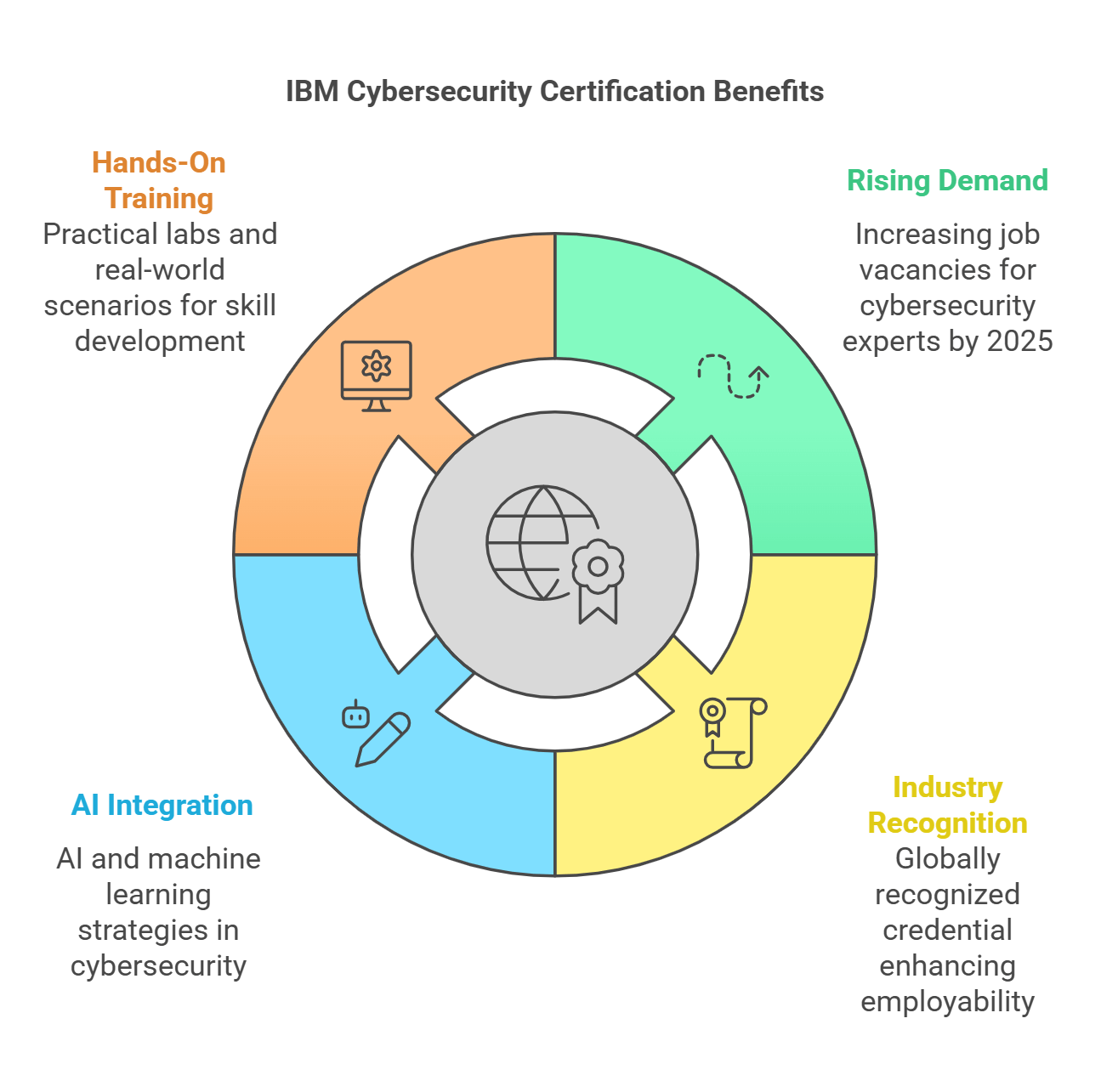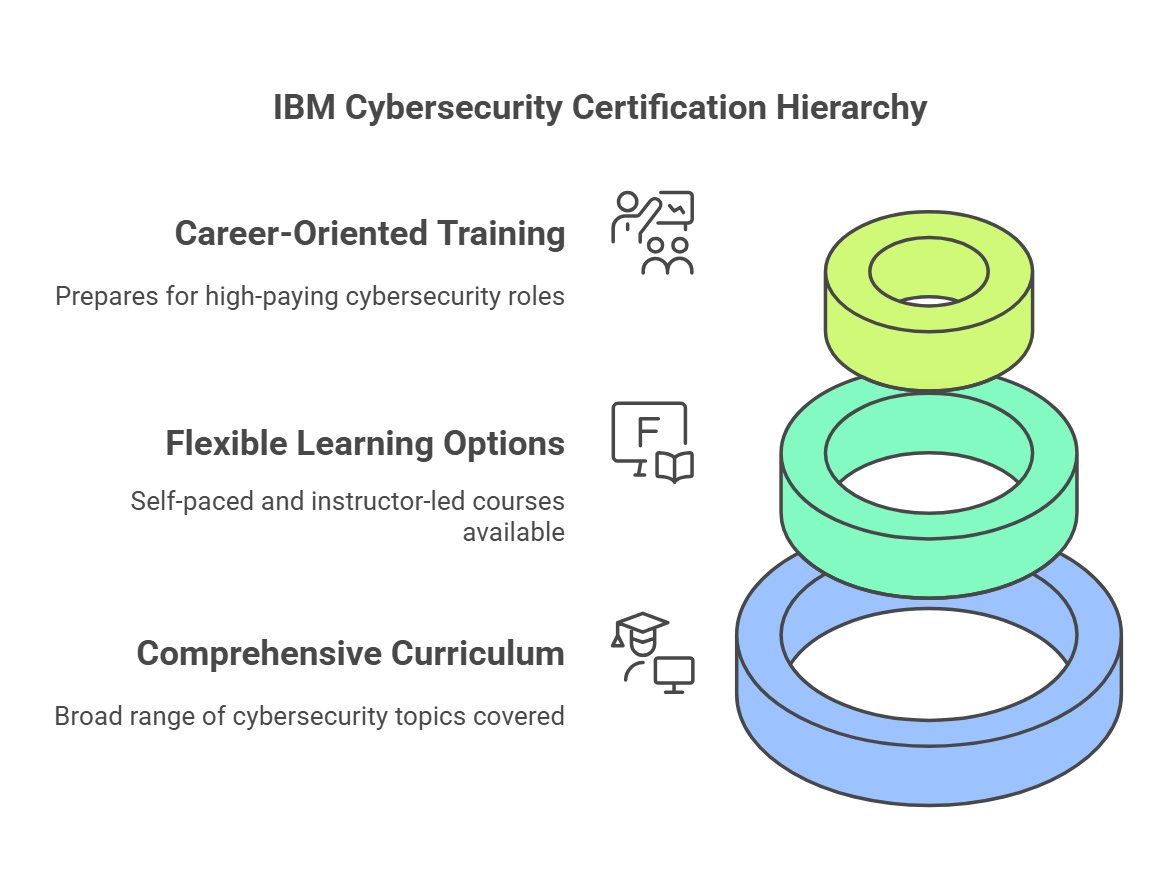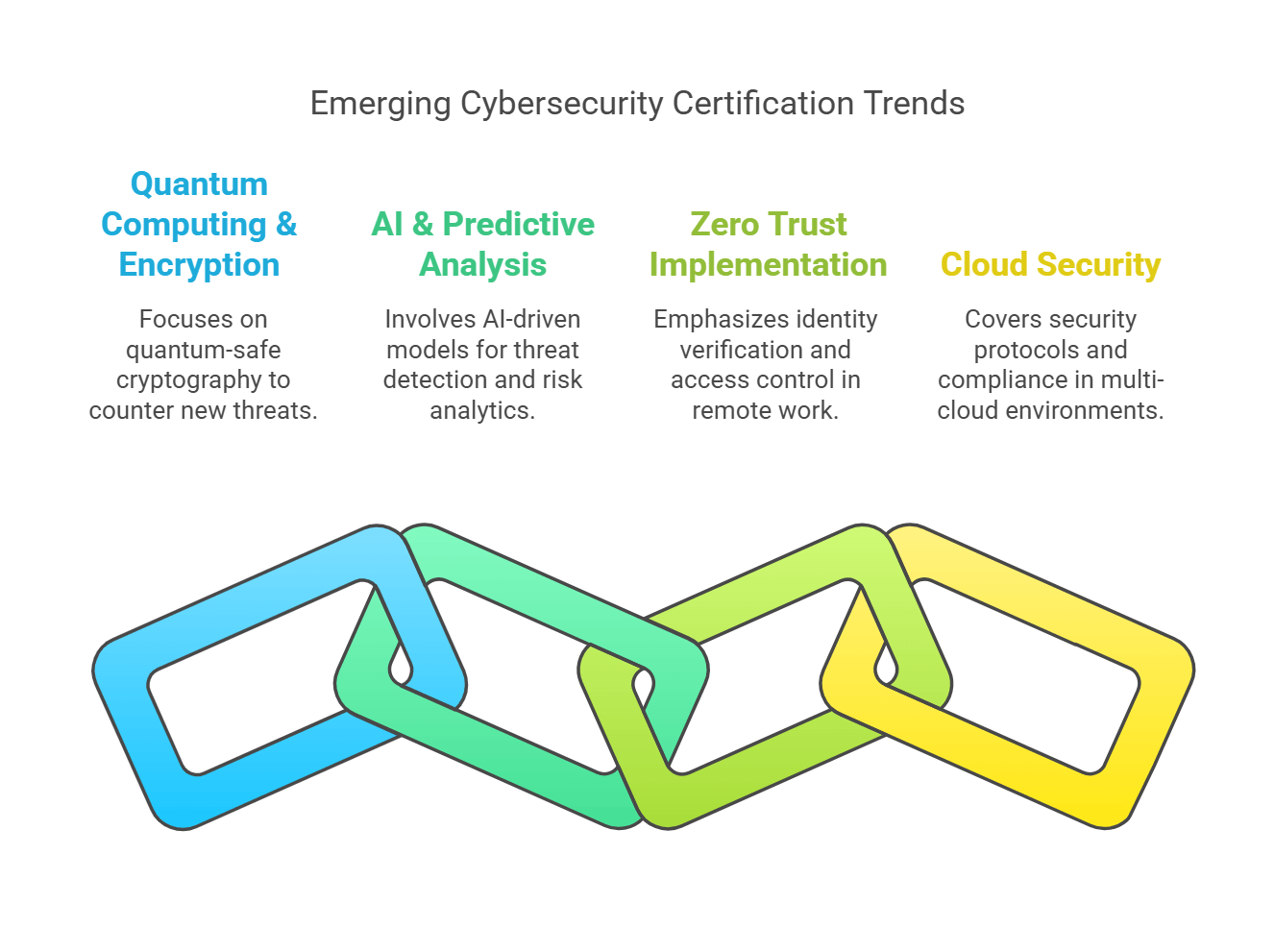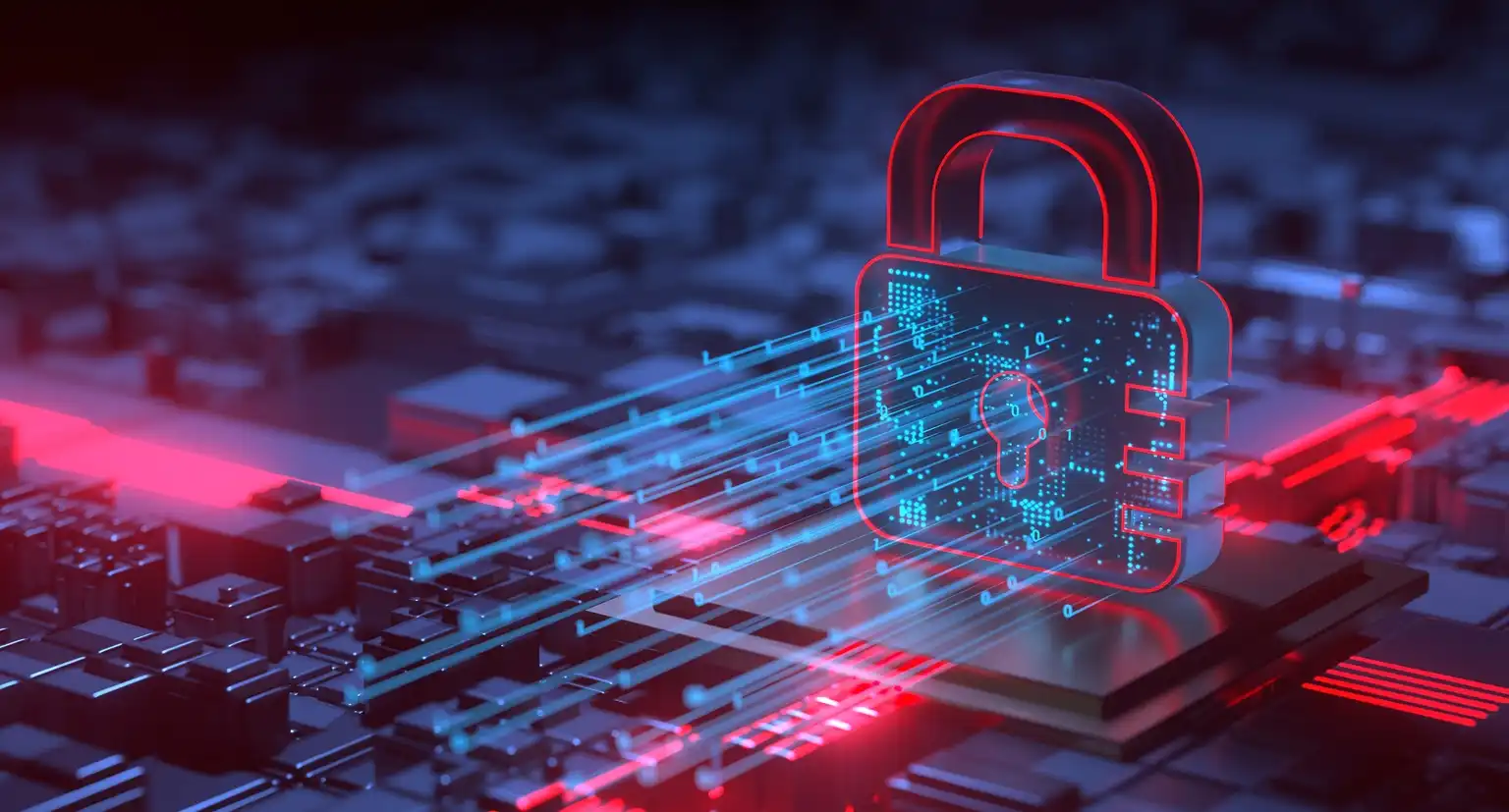Table of Contents
IBM Cybersecurity Certification: Elevate Your Career in 2025
Cybersecurity has become one of the most critical fields in the modern digital world. With organizations facing increasing cyber threats, the demand for certified professionals is higher than ever. The IBM Cybersecurity Certification is designed to equip individuals with the skills, knowledge, and practical experience required to excel in this field.
For those looking to get started, a free cybersecurity certification course is a great way to gain foundational knowledge without the initial investment. By 2025, the global cybersecurity job market is expected to grow exponentially, making IBM’s certification a key stepping stone for professionals looking to stay ahead. This guide provides an in-depth look at the IBM Cybersecurity Certification, its benefits, industry recognition, and how it compares to other certifications like ACSMI.
Why IBM Cybersecurity Certification in 2025?
As cyber threats evolve, businesses require skilled professionals to safeguard their digital assets. The IBM Cybersecurity Certification equips individuals with advanced tools and strategies to combat security challenges. It integrates AI-driven solutions, real-world simulations, and hands-on training to ensure professionals stay ahead in a rapidly changing cybersecurity landscape.

1. Rising Demand for Cybersecurity Experts
With the increasing number of cyber threats, businesses struggle to find skilled professionals. Reports indicate that cybersecurity job vacancies will surpass 3.5 million globally by 2025. IBM’s certification equips professionals with in-demand skills like threat intelligence, risk assessment, and security operations management, ensuring they remain valuable assets to organizations.
2. Industry-Recognized Credential
The IBM Cybersecurity Certification is recognized worldwide as a mark of excellence in cybersecurity expertise. Whether you are looking to work in finance, healthcare, government, or IT, this credential increases employability, helping professionals land higher-paying roles in leading organizations.
3. AI and Machine Learning in Cybersecurity
IBM integrates AI-powered threat detection, machine learning security models, and automation into its certification program. With cyberattacks evolving, AI-driven cybersecurity strategies are crucial in preventing large-scale breaches and reducing response times.
4. Hands-On Labs & Real-World Training
Unlike theoretical learning, the IBM Cybersecurity Certification provides real-world scenarios, cloud security training, and simulated cyberattack exercises. These labs allow professionals to develop hands-on skills in penetration testing, ethical hacking, and risk mitigation.
Key Features of IBM Cybersecurity Certification
The IBM Cybersecurity Certification is designed to provide a comprehensive learning experience with practical, real-world applications. It covers a wide range of security topics, from threat intelligence to cloud security and AI-powered defense strategies. The program ensures professionals are equipped with the latest skills and knowledge to tackle modern cyber threats effectively.

1. Comprehensive Curriculum
IBM’s certification covers a broad range of cybersecurity topics to ensure that learners gain both foundational and advanced knowledge. Key areas include:
-
Threat Intelligence & Cyber Defense – Learning how to identify, analyze, and mitigate cyber threats effectively.
-
Ethical Hacking & Penetration Testing – Conducting security assessments and penetration testing on IT infrastructure.
-
Cloud Security & Zero Trust Architectures – Understanding how to secure cloud environments and implement zero-trust models.
-
Incident Response & Risk Management – Handling cyber incidents, developing response plans, and mitigating risks proactively.
-
AI-Powered Cybersecurity Solutions – Using AI and machine learning to automate security operations and detect sophisticated threats.
2. Flexible Learning Options
IBM offers self-paced learning and instructor-led courses, making it ideal for working professionals. Whether you’re a beginner or an experienced cybersecurity expert, the program is designed to fit different learning preferences and schedules.
3. Career-Oriented Training
The IBM Cybersecurity Certification is ideal for those aiming for high-paying cybersecurity roles such as:
-
Cybersecurity Analyst
-
Threat Intelligence Specialist
-
Incident Response Engineer
-
Security Consultant
-
Chief Information Security Officer (CISO)
IBM Cybersecurity Certification vs. ACSMI Certification
While IBM’s certification is an excellent entry-to-mid-level program, ACSMI Certification is designed for those seeking expertise in niche areas like quantum cryptography, multi-cloud security, and global cyber risk management.
|
Feature |
IBM Cybersecurity Certification |
ACSMI Certification |
|
Ideal for |
Entry to Mid-Level Professionals |
Senior Experts & Leadership Roles |
|
Modules |
AI-based security, incident response, cloud security |
Advanced cybersecurity, quantum cryptography, global risk management |
|
Hands-on Training |
Simulated Cyberattack Labs |
Real-world multi-cloud security case studies |
|
Global Recognition |
Industry-Recognized |
Internationally Recognized |
|
Best For |
Professionals aiming for quick employability |
Experts aiming for executive roles |
For those seeking a well-rounded cybersecurity career, combining IBM’s technical foundation with ACSMI’s advanced specialization can pave the way for executive-level cybersecurity roles.
Future Trends in Cybersecurity Certifications (2025 and Beyond)

1. Quantum Computing & Encryption Security
Quantum computing is expected to break traditional encryption methods, posing new security threats. Future cybersecurity certifications, including IBM’s, now include quantum-safe cryptography to prepare professionals for this challenge.
2. AI & Predictive Cybersecurity Analysis
By 2025, AI-driven cybersecurity models will dominate the industry. Professionals must understand machine learning-based threat detection, automated security audits, and predictive risk analytics to stay competitive.
3. Zero Trust Security Implementation
With increasing remote work and cloud adoption, companies are shifting towards zero-trust security frameworks. Certifications now include modules on identity verification, least-privilege access, and multi-factor authentication models.
4. Cloud & Multi-Cloud Security
As businesses move towards multi-cloud infrastructures, cybersecurity professionals must master cloud security protocols, compliance frameworks, and container security technologies.
Final Thoughts
The IBM Cybersecurity Certification remains one of the most valuable credentials for cybersecurity professionals in 2025. Its hands-on labs, real-world training, AI integration, and cloud security modules make it an essential certification for anyone looking to break into or advance in cybersecurity.
For those aiming for senior leadership roles, combining IBM’s certification with ACSMI or CISSP can lead to higher-paying cybersecurity positions.
Are you ready to future-proof your cybersecurity career? Enroll in the IBM Cybersecurity Certification today and take the first step towards a successful cybersecurity future!
FAQs on IBM Cybersecurity Certification
1. How long does it take to complete IBM Cybersecurity Certification?
It takes 6 to 12 months, depending on the learner’s pace and prior experience. Self-paced learning options allow flexibility in scheduling.
2. Is IBM Cybersecurity Certification globally recognized?
Yes, IBM’s certification is widely accepted across finance, healthcare, government, and IT sectors, making it valuable for professionals worldwide.
3. How much does IBM Cybersecurity Certification cost?
The program costs between $500 and $1,200, depending on additional training modules, exam retakes, and instructor-led courses.
4. What job roles can I apply for after certification?
IBM-certified professionals can pursue roles like Threat Intelligence Analyst, Cybersecurity Consultant, Incident Response Engineer, and SOC Analyst.
5. How does IBM’s certification compare to CISSP or ACSMI?
IBM’s certification is entry to mid-level, whereas CISSP and ACSMI are designed for senior-level professionals focusing on strategic cybersecurity leadership.
6. Can I combine IBM’s certification with other cybersecurity programs?
Yes! Many professionals start with IBM’s certification and advance to programs like CISSP or ACSMI to specialize in niche cybersecurity areas.
7. What industries require IBM Cybersecurity Certification?
Industries such as banking, healthcare, government, retail, and technology actively seek IBM-certified cybersecurity experts.
8. Does IBM’s certification cover AI in cybersecurity?
Yes, IBM integrates AI-powered threat detection, machine learning-driven analytics, and cybersecurity automation tools into its curriculum.

Leave a Reply